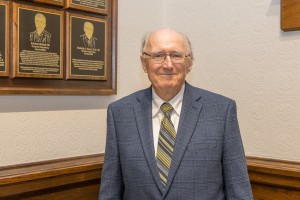 Dr. Frederick "Fred" Perner ’67 credits his father, a master machinist who worked for Miller Brewery, for instilling the most critical skill for his engineering career: the conviction he could make or fix anything. This mindset, combined with his working-class upbringing in Milwaukee, would propel him through a lifetime of engineering innovation and achievement.
Dr. Frederick "Fred" Perner ’67 credits his father, a master machinist who worked for Miller Brewery, for instilling the most critical skill for his engineering career: the conviction he could make or fix anything. This mindset, combined with his working-class upbringing in Milwaukee, would propel him through a lifetime of engineering innovation and achievement.
Fred’s path began in the office of his middle school guidance counselor. When the counselor asked what he wanted to be, Fred’s response focused on his two passions. “I wanted to be an engineer and drive trains,” he recalls. When asked what kind of engineer, he chose electrical. “I knew that steam engines would eventually be replaced by diesel-electric locomotives.” This conversation set his academic focus for high school, where he enrolled in a rigorous program that included working in the electric shop, laying a foundation of hands-on experience in electricity and electronics.
In 1963, MSOE representatives presented at Fred’s high school during Engineer Week. He was drawn to the university’s strong ties to local industries and the near-guaranteed prospect of a good job after graduation. He applied to MSOE and was offered a full-tuition scholarship.
During his first few years on campus, Fred experienced challenging times. He grappled with a debilitating stutter, difficulty reading and what he describes as “a memory like a sieve.” Despite this, the university’s intimate learning environment fostered an outcome for success. “The small class sizes and sympathetic professors made my stuttering a non-issue,” he says. Years later, he learned that an eye-tracking problem had made reading difficult. To compensate for his poor memory, he became a visual learner, focusing on understanding core principles rather than memorizing formulas. This problem-solving approach, which emphasized visualizing solutions based on a solid command of the basics, became a cornerstone of his career.
After graduating in 1967, he took his first job at IBM’s power systems development group in New York. He became an expert in semiconductor modeling, using the company’s powerful computers to advance the design and performance of electrical components. His work identifying failure mechanisms in high-voltage power transistors and uncovering their reverse bias I-V characteristics was groundbreaking. Through IBM’s work-study programs, he earned a master’s degree from Syracuse University and was one of only two employees chosen for the resident study program, which allowed him to complete his Ph.D. at Stanford in 1973.
In 1980, Fred joined Hewlett-Packard (HP) Labs as a circuit designer, where he focused on developing and evaluating silicon technologies for future HP products, and became a specialist in memory design. One of his proudest achievements was solving a critical sensing issue in resistance-based memory. Identifying the state of a single memory cell among millions seemed impossible, but his innovative “equi-potential isolation” solution paved the way for the development of modern MRAM and memristor memories. This was just one of the breakthroughs that contributed to the 186 U.S. patents he now holds from his time at HP.
When he retired in 2005, Perner’s expertise remained in high demand. Three years later, his former team at HP called him back to work on a promising new memristor memory project. “It was satisfying to get the call: ‘We cannot find anyone with skills like yours,’” he remembers. He worked for another five years as a design consultant before officially retiring in 2013.
After working through a health issue amid the COVID-19 pandemic, a near-death experience sparked a new intellectual pursuit for Fred: human collective consciousness. The word “INVERT” came to him, inspiring him to think outside the box and question the nature of reality. This research also paralleled his interest in AI technology. “My vision of future AI is a system of distributed low-power devices based on the structure and functioning of the human brain with direct access to the collective consciousness of the universe.”
In 2024, Fred Perner honored his roots by committing to an estate gift that will establish the “Fred Perner Endowed Distinguished Faculty Chair” at MSOE, which will support the appointment of highly qualified faculty to further AI education in the future. His induction into the MSOE Wall of Distinction celebrates not only his generous support but also his incredible career, which serves as a powerful testament to his belief that “there is no better place than MSOE to get started.”
